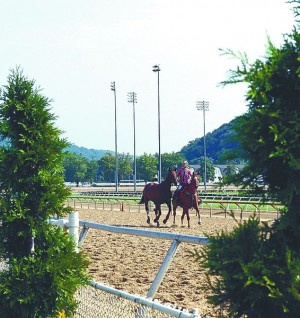
A backside employee at Mountaineer Casino, Racetrack & Resort works out two thoroughbred horses in 2014. The racetrack’s 2015 season opens on Sunday.
NEWELL, W.Va. — The start of the 2015 racing season at Mountaineer Casino, Racetrack & Resort on Sunday is being met with a mix of optimism and consternation on the part of horsemen.
Post time is 7 p.m. Sunday, and the card has been filled for the nine scheduled races, said Mountaineer Director of Racing Rose Mary Williams.
“We go into every season with a positive feeling,” she said. “We just took our first entry on Tuesday. … We feel that the fields will continue to grow.”
Casting a shadow over the 2015 meet are continuing concerns over anticipated revenue shortfalls, a smaller purse fund, competition from a new racetrack casino just 45 miles away and expectations of a shorter racing season.
Mountaineer will be running thoroughbred races on many of the same days that the Hollywood Gaming at Mahoning Valley Race Course in Austintown, Ohio, is operating. The Ohio racetrack opened in November 2014 and has live racing on Monday, Tuesday, Wednesday and Saturday.
Mountaineer’s racing schedule runs from Saturday to Wednesday, so there is overlap with Hollywood Gaming on every day but Sunday. However, post times differ, with Mountaineer running after 7 p.m. and Hollywood Gaming running from 12:45-4 p.m.
“We’d love to have 10 horses in each race,” Williams said, “but with the competition, it’s hard. We’re both competing for the same horses.”
Mountaineer has been approved for 210 racing days this year, the current minimum allowed by law, but that schedule may be shortened if the purse fund runs low, Williams said.
A bill pending in the West Virginia House of Delegates would set the minimum at 185 days, and some horsemen fear that a new statutory minimum will be a slippery slope toward even shorter racing schedules.
“If that legislation goes through, they’ll never get those days back,” said Hancock County owner/trainer Mike Vales.
Vales and owner/trainer Jeff Zook recently submitted an alternate proposal to Mountaineer and the Mountaineer Park Horsemen’s Benevolent and Protective Association, asking for eight races a day instead of nine, revisions to the condition book that would set new top and bottom purse amounts, a cut in stakes races, and a cap on purses at $80,000 daily.
Their proposal, which they said was endorsed by 150 horsemen, differs from Mountaineer’s 2015 policy in several ways and has virtually no chance of being adopted, officials said.
“You’re always going to have people that don’t understand things or don’t like change,” Williams said, “but the HBPA represents the horsemen, and I can’t only deal with that group. I can’t even consider that (proposal) because of my contract with the HBPA.”
Williams recently attended a special meeting of the HBPA, which represents about 1,400 horsemen, and talked about the coming racing season. Among the topics discussed was the unlikelihood of running 210 days this year.
“I met with the horsemen and explained why that’s not feasible. The meeting turned out very well. There are just a very few horsemen who say they don’t understand why they can’t run 210 days,” she said.
Williams said she and the HBPA leadership are in agreement that a 185-day schedule is “a good fit” for Mountaineer.
But Vales and Zook said running nine races a day with an average daily purse of $90,000 is unsustainable. Williams’ expectation of a 185-day season, they said, will become a self-fulfilling prophecy.
“It’s a very bleak outlook. There’s just a lot of uncertainty,” said Zook, whose mother, Donna Zook, is a member of the HBPA board. “If you’re spending more money at the start, it’s not going to get better through the course of the year.”
HBPA Vice President Jennifer Johnson struck a more optimistic note, saying that Mountaineer and HBPA management are trying to work together for the betterment of Hancock County’s horse racing industry.
Johnson, owner/trainer/breeder with Royal Oak Farm on Gas Valley Road, said she also felt the horsemen’s meeting with Williams went well.
“I think a lot of the members were happy to ask her questions directly,” she said. “There were a lot of things we had to pull together to make it work. She gave a little; we gave a little.”
Johnson said Mountaineer needs to play to its strengths, not only as a gaming destination but also as family-friendly entertainment, to stay competitive with racetracks in Ohio and Pennsylvania.
“I feel Mountaineer does an excellent job of bringing customers into their casino. It’s amazing they do as well as they do,” she said.
The debate over how best to adjust to changing market conditions intensified in 2014 when Mountaineer management asked the West Virginia Racing Commission for a reduction in the number of live racing days in December.
Mountaineer’s request was driven by concerns over a shrinking field size, increasing competition from racetrack casinos in Ohio and Pennsylvania, and reductions in the purse fund that horsemen rely on for winnings.
Last year, West Virginia Gov. Earl Ray Tomblin signed a bill that cuts video lottery revenue appropriations to various thoroughbred and greyhound breeders and purse funds by 10 percent and redirects them to the State Excess Lottery Revenue Fund.
Because Mountaineer’s purses rely heavily on revenue from video lottery and table gaming at the casino, the law, which took effect on July 1, 2014, will cut an estimated $2.5 million annually from the horsemen’s purse fund.
Although originally denied the request, Mountaineer ended up cutting December racing because of concerns that the purse fund was insufficient.
Mountaineer starts the 2015 season with a purse fund, including carryover, of about $4.3 million. The racetrack also has cut purses by 20 percent, Williams said.




